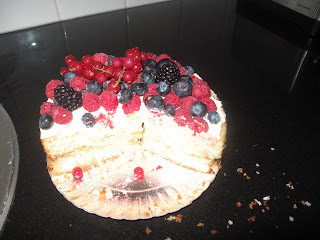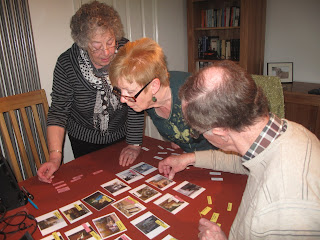In this post we are going to look at Indirect Object Pronouns:
lui = to (for) him or her
leur = to (for) them
With indirect object pronouns, there are no past participle agreements
PRESENT TENSE
La serveuse donne le café au monsieur
The waitress gives the coffee to the gentleman /... gives the gentleman the coffee
La serveuse lui donne le café
The waitress gives the coffee to him / The waitress gives him the coffee
PERFECT (PAST) TENSE
La serveuse a donné le café au monsieur
The waitress gave the coffee to the gentleman
La serveuse lui a donné le café
The waitress gave him the coffee
PRESENT TENSE
La grand-mère prépare la soupe pour sa petite-fille
Grandmother prepares the soup for her granddaughter
La grand-mère lui prépare la soupe
Grandmother prepares the soup for her
PERFECT (PAST) TENSE
La grand-mère a préparé la soupe pour sa petite-fille
Grandmother prepared the soup for her granddaughter
La grand-mère lui a préparé la soupe
Grandmother prepared the soup for her
PRESENT TENSE
La professeur donne les devoirs aux élèves
The teacher gives the homework to the pupils
La professeur leur donne les devoirs
The teacher gives the homework to them / The teacher gives them the homework
PERFECT (PAST) TENSE
La professeur a donné les devoirs aux élèves
The teacher gave the homework to the pupils
La professeur leur a donné les devoirs
The teacher gave them the homework
me (m') = to (for) me
te (t') = to (for) you (singular, familiar)
nous = to (for) us
vous = to (for) you (plural, polite)
PRESENT TENSE
Le monsieur dit.....
The gentleman says.....
"La serveuse me donne le café"
The waitress gives the coffee to me / The waitress gives me the coffee
PERFECT (PAST) TENSE
Le monsieur a dit....
The gentleman said....
La serveuse m'a donné le café
The waitress gave me the coffee
PRESENT TENSE
La grand-mère dit à sa petite-fille....
Grandmother says to her granddaughter.....
"Je te prépare la soupe"
I am preparing the soup for you
PERFECT (PAST) TENSE
La grand-mère a dit à sa petite-fille....
Grandmother said to her granddaughter....
Je t'ai préparé la soupe
I prepared the soup for you
PRESENT TENSE
La professeur dit aux élèves....
The teacher says to the pupils...
"Je vous donne les devoirs"
I am giving you the homework
PERFECT (PAST) TENSE
La professeur a dit aux élèves....
The teacher said to the pupils....
Je vous ai donné les devoirs
I gave you the homework
PRESENT TENSE
Les élèves disent à la professeur.....
The pupils say to the teacher...
"Vous nous donnez les devoirs"
You are giving us the homework
PERFECT (PAST) TENSE
Les élèves ont dit à la professeur....
The pupils said to the teacher....
Vous nous avez donné les devoirs
You gave us the homework
To telephone someone in French is téléphoner à. If a verb is followed by à then you need to use an indirect object pronoun
Exemple:
PRESENT TENSE
David Cameron téléphone à Barack Obama
David Cameron telephones Barack Obama
David Cameron lui téléphone
David Cameron telephones him
PERFECT (PAST) TENSE
David Cameron a téléphoné à Barack Obama
David Cameron telephoned Barack Obama
David Cameron lui a téléphoné
David Cameron telephoned him

























